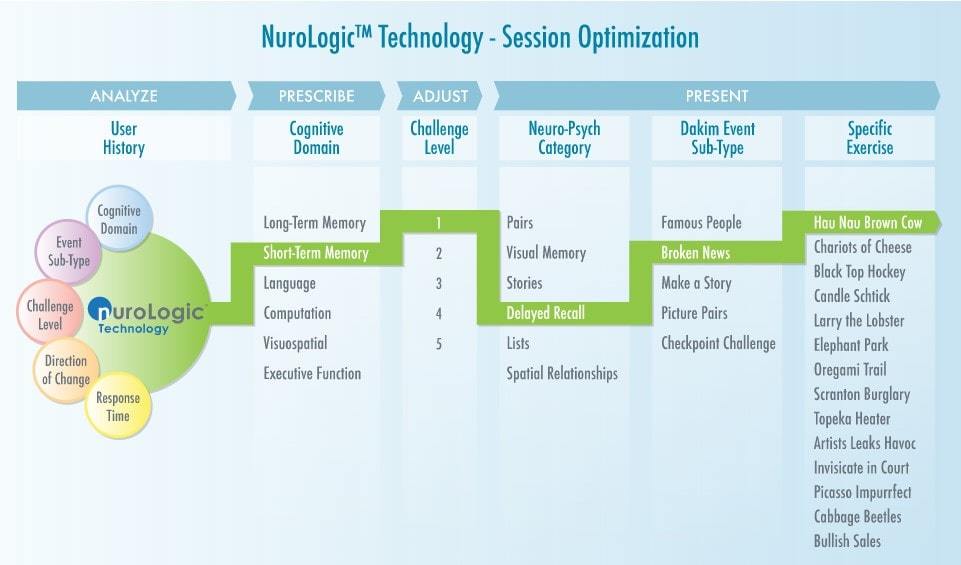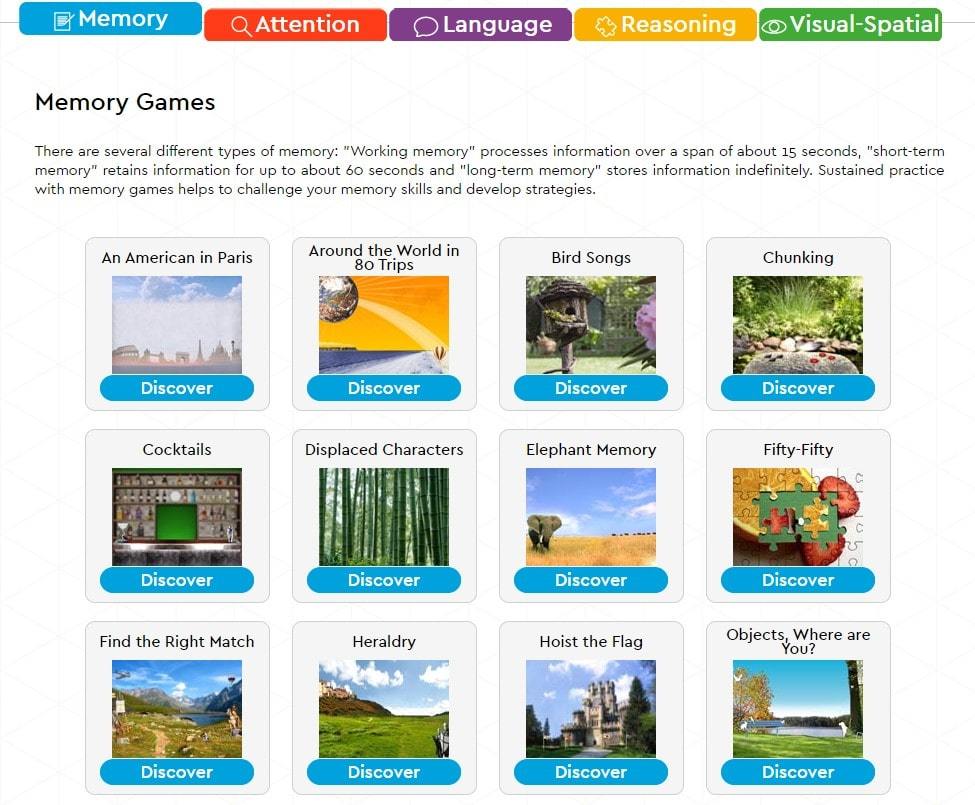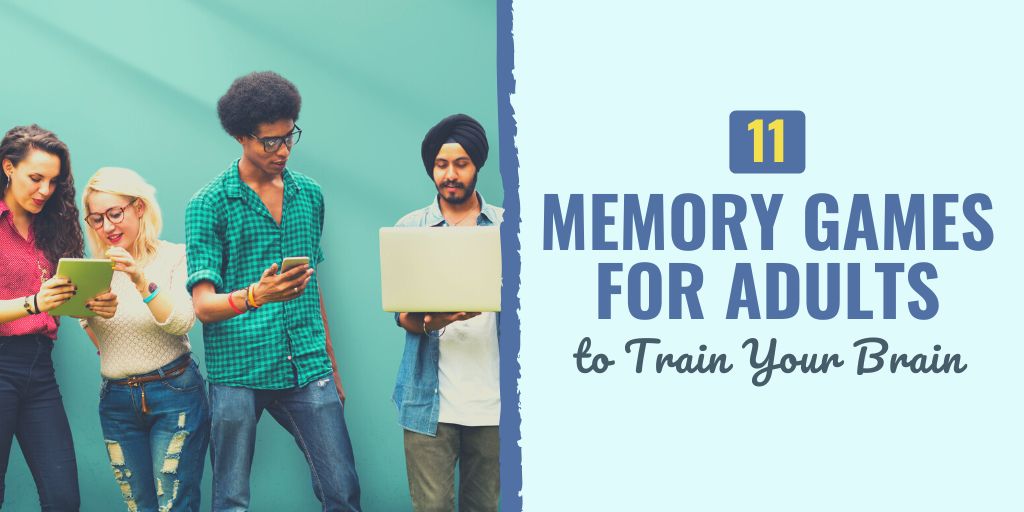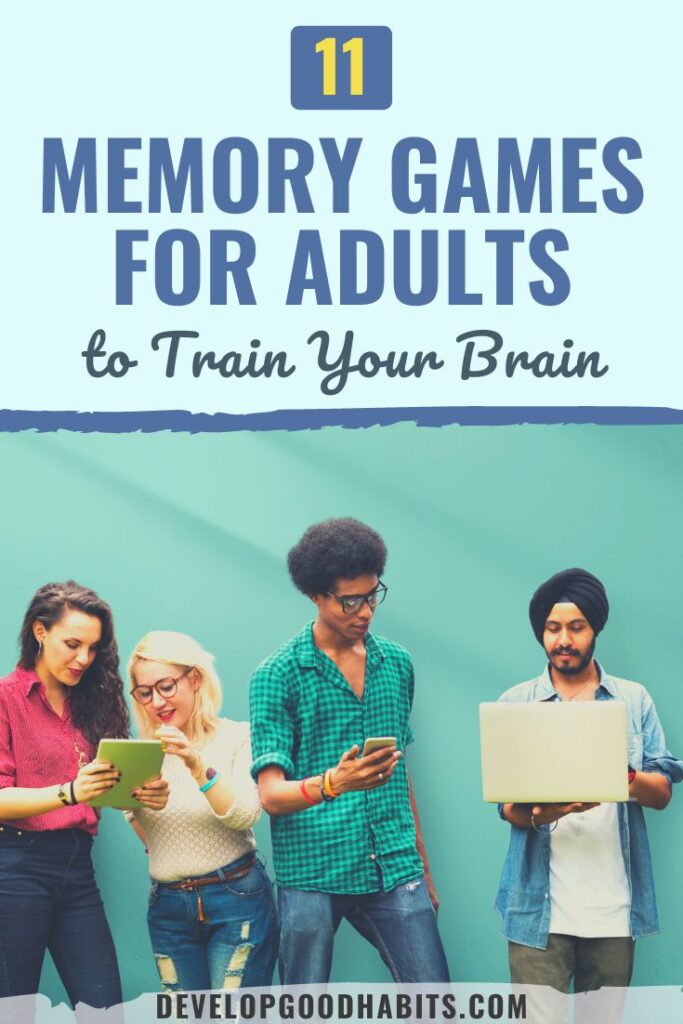Keeping your brain active is just as vital as physical exercise, but brain games can be enjoyable and engaging, unlike workouts, which can feel like a chore.
Surprisingly, cognitive decline can begin as early as your 20s and 30s, making it crucial to challenge your mind at every age. Playing brain games and maintaining healthy habits is key to preserving a sharp memory as you age.
Not only will playing brain games reduce or delay your risk for cognitive impairment during your later years, it will also strengthen specific thinking skills that usually decrease with age, such as your:
As we age, we naturally use specific thinking skills less, especially outside the workforce.
Playing memory games can help strengthen these mental abilities and build your cognitive reserve—a “savings account” of brainpower to draw on when quick thinking is required.
These games boost memory resilience and keep your mind sharp and engaged.
In this article, we’ll explore 11 memory games for adults that are fun and challenging and offer something for everyone to enjoy. Let’s dive in!
11 Memory Games for Adults to Train Your Brain
1. Dakim
Dakim is a website that offers a “brain fitness program.” It offers users a clinically proven comprehensive brain workout through games and puzzles designed to significantly improve cognitive performance in short—and long-term memory, concentration, and focus.
In each of this site’s 100+ options for brain-training exercises, Dakim BrainFitness cross-trains users’ brains in six of the essential cognitive domains (long- and short-term memory, language, computation, visuospatial orientation, and executive functioning.)
You can try the program for free, but the software is expensive if you want full access for personal use. Dakim also sells its program to senior living facilities at varying costs.
Users appreciate that this program offers a few unique attributes that make Dakim stand out from other computer brain games, such as:
Dakim uses its patented NuroLogic™ Technology, which tailors each user’s experience in real-time by monitoring their progress through each session.
NuroLogic Technology can then personalize the sequence and challenge level of the exercises presented (across the six cognitive domains) to match the user's performance.
This helps ensure users get a comprehensive cognitive workout to get the most out of every session. This is the process used to adjust the exercises as needed:

This is a great option for those who are beginning to feel the impact of aging on their brain and want to engage in more cognitive exercises regularly.
2. Happy Neuron
Happy Neuron is a website that offers games and activities to exercise users’ memory, attention, language, executive functioning, and visual/spatial reasoning.
Happy Neuron personalizes the training to fit each user, tracking your progress and presenting you with games based on scientific research.
Happy Neuron offers a 28-part series of computer games focusing on the above-mentioned brain functions. Examples of exercises include rebuilding an intricate medieval shield as fast as you can or retracing your virtual route through a popular city.
Happy Neuron's neuroscientists and computer engineers say that this type of mental cross-training helps formulate and maintain critical thinking skills, such as memory.
Here is an example of what some of the memory games look like:

You can try this program for free for seven days, but after that, it costs some money for a subscription.
3. Keep Your Brain Alive by Lawrence Katz and Manning Rubin
Check Price on Amazon | Check Audiobook Price
Keep Your Brain Alive: 83 Neurobic Exercises was written by a neurobiology professor from Duke University, Lawrence C. Katz, Ph.D., and Manning Rubin. In it are 83 “neurobic” (neuro + aerobic) exercises that use all five senses in unusual ways to keep your brain strong and healthy.
Based on the most recent neuroscience, these exercises are deceptively simple but will stimulate your brain and encourage the growth of new brain cells and new cerebral nerve connections.
The exercises explained in this book will help you break your everyday routines in a way that will keep your brain guessing and engaged. The activities stimulate the nerve cells in your hippocampus and cerebral cortex, which are the areas of your brain responsible for memory and creativity.
The authors argue that maintaining cognitive health requires people to use all five senses in unexpected ways to stay mentally fit enough to meet daily challenges like remembering someone’s name, learning a new skill, and maintaining creativity.
Living on autopilot every day will lead to atrophy in the brain rather than growth.
The nine chapters in this book cover:
A neurobic should do at least one of the following:
- Involve at least one of your senses in a new way (smell or taste something new)
- Involve all of your attention, even if briefly
- Change your routine in a significant way
Some examples of neurobics include doing everyday activities such as:
These things take you out of autopilot and help you feel more focused and alert. Many readers have found this book very helpful in providing ideas for everyday cognitive exercises.
4. Chess
While some people think that Chess is only for exceptionally mentally gifted people, this is a wide misconception.
Sure, there’s some relationship between the ability to play Chess well and one’s overall intelligence, as playing Chess involves using various parts of your brain.
However, all types of people enjoy this game—and some even become masters. Some incredibly smart people never play beyond a beginner level.
Playing Chess is a beneficial hobby for anyone because it can improve cognitive function and memory.
Chess gives people a tool to engage in a rigorous brain workout. And, as the most crucial organ in the human body, the cells start to die when your brain doesn’t get any stimulation.
To play chess, you must use both hemispheres of your brain while working on object and pattern recognition. Over time, using the techniques in this game will work out and develop both sides of your brain.
When it comes to improving one’s memory, chess involves tactics and strategies that players learn as they go. This means that the more you play, the better your memory will become because you can start to recall and use different strategies and tactics.
The key is that chess's memory benefits are not limited to the game—your improved memory will be apparent in other areas of your life, such as your responsibilities, commitments, etc.
If you don’t have a chess set, here are three great options:
5. Educational Insights Brainbolt – Brain Teaser Memory Game
BrainBolt is a light-up memory game that challenges your brain to remember a light sequence. It helps you work your cognitive skills by requiring concentration and sharp short-term memory skills.
Users must follow along with the lights and watch, remember, and repeat the pattern as long as possible before making a mistake.
This is a great game to play alone, but it also offers a two-player option, a timed mode if you want to play a fast-paced game, and an advanced mode for those who have become experts. Users find this an addicting game to play until you can beat it.
It is a great option to bring while you’re traveling, as it is a handheld game that only requires three AAA batteries. This is an excellent option for kids and adults, as many find it challenging and fun.
6. SmartGames IQ Puzzler Pro, a Travel Game for Kids and Adults
This IQ-Puzzler Pro will help train your brain with 120 (2D and 3D) challenges in 3 playing modes. Due to its wide variety of game options, it is great for people of all ages.
Anyone can find a challenging game to play with this that can push their brain to new limits. The games help build your concentration, problem-solving, visual/spatial logic, and planning skills.
This is a great option for travel due to its compact size and travel case. While it is a single-player game, people often like teaming up with a partner to solve challenges.
This game comes with a compact game board, 12 colorful puzzle pieces, and a booklet with 120 challenges and solutions. It also comes with a free app that you can download that includes features to enhance your experience with this physical game.
Users appreciate how challenging this game becomes because it never gets old. It will keep you thinking and help train your brain by engaging you in the puzzle for hours.
For more games for the younger crowd, check out this roundup of the best memory games for kids.
7. Sudoku
This game of logic, problem-solving, and uncovering patterns is a brain game that helps stimulate cognitive function and offers people the satisfaction of finishing a tricky puzzle.
Your memory and your logic work in tandem when you’re playing Sudoku. You have to use your memory to memorize the numbers and your logic to fill in the blank spaces.
The University of Edinburgh found that doing Sudoku can help activate “survival genes” in your brain that remain dormant. These genes help elongate the lifespan of brain cells and help people resist memory-depleting diseases such as strokes.
Sudoku also helps train your brain because it requires you to think strategically and solve problems creatively.
If you stop playing when you’re in the middle of a game, you’ll have to restart the entire thinking process, which helps jog your memory and develop your concentration and re-focusing skills.
Here are five great Sudoku options:
8. Super Brain Yoga
Super brain yoga is a short and simple physical exercise that can help improve memory and increase brain power.
It boosts the electrical activity in your brain, activating it and getting it running properly. This practice has caught on among professionals and educators.
To do super brain yoga:
Here is a Super Brain Yoga routine you can follow.
Super brain yoga activates the pressure points around your earlobes that help stimulate the production of gray matter in your brain. It benefits your brain by:
9. The Tray Game
Ask a friend to get some sort of tray and put a lot of random items on it. Look at the items on the tray and then have your friend either remove it or cover it with a cloth.
Try to remember and then write down all the items on the tray.
You could make many variations for this game, including looking at a picture online and then minimizing it, and trying to recall the contents. But no matter how you do this, you’re testing and exercising your memory by working on remembering physical objects in the short term.
10. The Grocery List Game
There are a lot of variations of this game, but all of them can help improve memory function.
For this group game, gather some people and form a circle. The first person begins the game by saying, “I went to the store and bought…” Go around the circle and have each player add an item to the end of the list after naming the items that the previous players said in order.
The game's object is to remember as many items as you can in the correct order. The first person to mess up the order or to forget an item loses.
This is a quick and easy activity to play with friends to test and practice your ability to recall information. This activity strengthens the connections in your brain that enhance your brain’s ability to remember things and improve your memory with time.
You can change the first sentence of this game to make it personal to your group. One idea is to use “My favorite books are…” because recalling long titles makes this game even more difficult.
11. The Total Brain Workout by Marcel Danesi
Of course, you know that different areas of your brain control various cognitive functions and that, as long as you exercise your brain, you can strengthen each area.
Well, The Total Brain Workout: 450 Puzzles to Sharpen Your Mind, Improve Your Memory & Keep Your Brain Fit offers hundreds of challenging and fun puzzles that are designed to target the parts of your brain that are responsible for language, reasoning, and logic, memory, and visual perception.
Each of the 450 puzzles ranges from easy to advanced so that you can tailor your cognitive workout to your current level of functioning. Furthermore, each puzzle tells you exactly which area of your brain is being targeted as you’re working through it and the cognitive functions that are being controlled.
This allows you to customize your brain workout to your needs and areas of improvement.
Have Kids?: Check Out Our Post on Memory Games for Kids
Final Thoughts on Memory Games for Adults
Memory games are a fun and effective way to keep your mind sharp at any age.
Whether you prefer digital options like Dakim and Happy Neuron, classics like chess and Sudoku, or hands-on activities such as SmartGames IQ Puzzler Pro and the Tray Game, there’s something for everyone to enjoy.
These games enhance memory and improve focus, problem-solving skills, and overall mental agility. By incorporating exercises like Super Brain Yoga or books like Keep Your Brain Alive and The Total Brain Workout, you can create a diverse routine that challenges your brain in new ways.
Whichever games you choose, the important part is to make brain training an enjoyable and regular part of your life. Start exploring these options today and reap the cognitive benefits for years!
More Ideas to Improve Your Memory and Recall:
- 11 Best Memory Test Websites & Apps
- 10 Simple Ways to Improve Your Memory
- 4 Best Mindfulness Games for Adults (Our Review)
- 8 Best Online Educational Game Sites & Apps for Adults

Connie Stemmle is a professional editor, freelance writer and ghostwriter. She holds a BS in Marketing and a Master’s Degree in Social Work. When she is not writing, Connie is either spending time with her 4-year-old daughter, running, or making efforts in her community to promote social justice.














